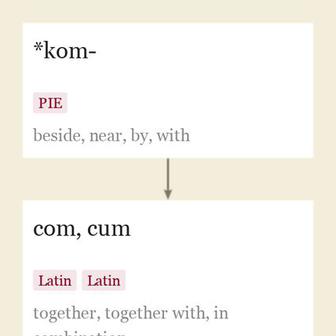contend (v.)
15世纪中期,“从事竞争,竞争”,源自古法语 contendre,直接源自拉丁语 contendere “伸展; 射击,投掷; 努力追求; 与...竞争,斗争”,来自 com- 的同化形式,这里可能是一个强调前缀(见 com-),加上 tendere “伸展”(来自 PIE 根 *ten- “伸展”)。从1540年代开始,“断言,肯定,维护”。相关: Contended; contending。
contend 的相关词汇

这是一个单词构成元素,通常表示“与,一起”,源自拉丁语 com,是古典拉丁语 cum 的古老形式,意为“一起,与,结合”,源自原始印欧语言 *kom- 的“旁边,附近,与”的意思(与古英语 ge- 、德语 ge- 类似)。在拉丁语中,该前缀有时被用作一种强调语气的方式。
在元音和清辅音前,缩写为 co-; 在 -g- 前,同化为 cog- 或 con-; 在 -l- 前,同化为 col-; 在 -r- 和 -v-, 前,同化为 cor- 和 con-; -c-, -d-, -j-, -n-, -q-, -s-, -t- 之前,也被同化为 con-。这种同化非常普遍,以至于经常被用作正常形式。
Proto-Indo-European 根词,意为“拉伸”,派生词意为“被拉伸的东西,细绳; 细长的”。
它构成或部分构成以下单词: abstain; abstention; abstinence; abstinent; atelectasis; attend; attenuate; attenuation; baritone; catatonia; catatonic; contain; contend; continue; detain; detente; detention; diatonic; distend; entertain; extend; extenuate; hypotenuse; hypotonia; intend; intone(v.1)“唱,吟唱”; isotonic; lieutenant; locum-tenens; maintain; monotony; neoteny; obtain; ostensible; peritoneum; pertain; pertinacious; portend; pretend; rein; retain; retinue; sitar; subtend; sustain; tantra; telangiectasia; temple(n.1)“供奉的建筑物”; temple(n.2)“额头两侧的扁平区域”; temporal; tenable; tenacious; tenacity; tenant; tend(v.1)“倾向于,朝某个方向移动”; tendency; tender(adj.)“柔软的,容易受伤的”; tender(v.)“正式提供”; tendon; tendril; tenement; tenesmus; tenet; tennis; tenon; tenor; tense(adj.)“紧绷的”; tensile; tension; tensor; tent(n.)“便携式遮蔽物”; tenterhooks; tenuous; tenure; tetanus; thin; tone; tonic。
它是假设的源头,其存在的证据由以下单词提供:梵语 tantram “织布机”, tanoti “拉伸,持续”, tanuh “细长的”,字面意思是“拉伸的”; 波斯语 tar “细绳”; 立陶宛语 tankus “紧凑的”,即“拉紧的”; 希腊语 teinein “拉伸”, tasis “拉伸,张力”, tenos “肌腱”, tetanos “僵硬的,坚硬的”, tonos “弦”,因此“声音,音高”; 拉丁语 tenere “持有,抓住,保持,维持”, tendere “拉伸”, tenuis “细,稀疏,精细”; 古斯拉夫语 tento “绳索”; 古英语 þynne “细长的”。
- contender
- contention
- contentious